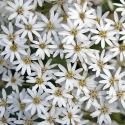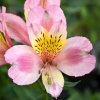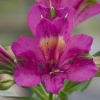Friday 27th October, 2017
Hi
There's always something new to learn from Mum...
My mum was here the other day, doing her thing at the nursery, and had brought out soup for her lunch which I was a bit curious about as I usually think of soup as a winter meal. So I asked "Why soup?" and it transpired she makes it to use up her abundance of parsley leaves. I had a taste and it was pretty good and knowing my mother it was probably pretty easy to make as well and so asked her for the recipe.
I always have
parsley in the garden but at this time of year the stuff is going to seed... understandably as Petroselenium crispum is a biennial and usually completes its life cycle in the late spring by rising up to flower. Which means that right now there is a huge amount of parsley just ready for picking and Parsley and Potato soup seems perfect to uses some of it up.
According to mum this recipe came from Marg, an old friend of my parents. Now I haven't made this one yet but it looks pretty easy and I imagine that you could add other flavours, I tend to make things up as I put together dishes.
1 large onion
4 cups chicken stock ( mum uses one of those liquid packet stocks but you could make your own)
2 Tbsp Flour
3/4 cup milk
2cups parsley
1 oz butter
1 large potato
salt and pepper
Finely chop onion and parsley and simmer for 30 minutes in the chicken stock
Rub through a sieve or blitz in blender until smooth.
Melt the butter and stir in the flour and then add the parsley liquid and season with salt and pepper.
Cube the potato and then simmer cook in the milk and when cooked mash and then add to the parsley mixture and stir through.
PS. Now is the time to plant
new parsley plants so that they last for another year but if they get stressed in the summer by being too dry then they may start to go to seed early and you will have to replant in the early Autumn for a supply all the way through the winter. Winter planting is all about planting early enough so that the plants get big enough prior to the cool season as growth slows.
There is only one type of
Tarragon to grow and that is the French one as opposed to Russian which is no substitute.. Russian Tarragon can be grown from seed but I believe that the French version is sterile and has to be grown from divisions.
You can tell if you have the real McCoy as when you nibble on the leaves it tingles your tongue. Now French Tarragon is a bit of a shy grower and so its one of those plants that you have to look after and to be fair I almost find that it does best in pots. There is no reason not to grow it in the garden but make sure that its in a very sunny and well drained position.
French Tarragon is winter dormant and so will die down to a rosette of leaves and so remember where you plant this aniseed flavoured herb. Like all perennials Tarragon will do best if lifted and divided otherwise it loses vigour and in the case of this herb I suggest to do it as its start to re grow each year. Harry has already started to harvest these leaves to infuse in olive oil to preserve the flavour for the coming year but there is nothing like using the herb fresh.
Tricky garden positions need thought as to the right plants
The neat thing about gardening is that there is always different positions that have different light levels and moisture and as such the plants have to be chosen to suit such a space. I have been thinking to do some plantings along the stream that run through our gardens and some of these areas are quite shaded due to the canopy of trees above. I thought to try some of the native begonia and to see if i can get it to naturalise along the easement stream where the light levels are really low due to the
Kahikateas growing there.
This shade loving herbaceous ground cover also loves the damp. Found at the base of waterfalls and along streams and gullies so plant where consistent moisture is available. Filtered light will bring out the bronze tones but full shade is enjoyed by this lovely native perennial. Looks great co planted with ferns. Evergreen.
These do look really pretty in flower and would have to be the most floriferous of the native olearias. My experience of the Olearias is that they like more light than less and so thought to try some of these on the banks of our stream but in the more open areas where they will get some sun.
In spring this shrub is smothered in large clusters of white flowers. Olearia cheesemanii or tree daisy is an evergreen NZ native and a medium growing bushy shrub with narrow pointed thin leathery dark green leaves. This shrub will thrive well in windy conditions, is suitable for hedging, very clippable, or use in boarder or shrub garden.
Kahikatea, Elatostema, Olearia, Carpodetus
New 2Us
I always like to pick up different plants to offer our clients but I don't always know them so well, for example Plectranthus. Now I know there are many different cultivars and species of this genus and that they generally like a warmer climate which is why they are not usually offered in the Waikato. I'm sure that there are many out there with little hots spots (micro climate) that would suit this family of foliage plants. Velvet Elvis is the first of the Plectranthus that we have had in our plant stock database but I will look out for some more as they do have awesome foliage.
Truly dramatic foliage from which numerous spikes of lavender coloured flowers begin to appear from late summer through autumn complimenting the ornamental foliage of deep green leaves with dark purple, almost black, coloured undersides. Wonderful in shady areas in the garden as well as making an ideal container or basket specimen for sheltered patios or entertainment areas.
Watch out next week for some other different plants from the Lambs ear genus Stachys, being macrantha and discolour, and both of these have green leaves instead of the furry grey leaves that we all know so well.
Also coming are some rosemary but not with the usual blue flower but the pink and white flowered forms
some gorgeous dark deep coloured hybrid clematis that we havent had before, check out Belle of Taranaki.
Fluff and colour to highlight this week
Calibrachoa Holy Moly &
Cruze Pink Rose Eye,
Cruze red, make for fabulous colour for the hot sumnmer months seeming to be endlessly in flower. These members of the Petunia breeds make for spectacular pot and hanging baskets subjects but are equally at home in the garden. Dont keep these over watered and they just love the heat and sun of summer
Alstroemerias or
Peruvian Lilies.. Ang has been increasing the range of these hardy plants that do so well in the garden and/or in pots.. these will cope with full sun through to partial shade.
Pink Lady, Maya, Yuko, Sara, Machu
Trees from $15.00 and more half price pots just arrived
We have put selected trees on special so bring a trailer as these must be collected, they are too tall to courier. We are needing to space out the trees in the nursery and that means that some trees need to move on and go to the sales area.
Flowering cherries from half price, birches from $15. Come on in and check them out for yourself.
Kumaras slips just flew out last week and there is a whole new batch arriving Tuesday so be in quick if you want some of these. Kumara are a great crop to grow and if you put enough in then you will have plenty to store for months later. Make sure that when you harvest them not to damage the skins and cure them off so they keep well.
Rain and warm spring weather make for fungal problems
These persistent showers that are happening at the moment make the perfect growing conditions for all fungal infection from black spot on the roses to curly leaf on stonefruit. For black spot on roses, spray with
Super Shield but do two close sprays togather just a day or so apart so as to nail the spores that may still linger. Spray prior to rain and again after the rain and this should keep your roses clean.
Copper will help on all but needs to be applied regularly as it is a preventative fungicide. Good cultural practice is to take away all the fallen leaves and put in the rubbish, this removes the spores that sit there which will reinfect the good leaves.
Be gentle if planting your new plants at this time of year as all plants in the spring growth flush are more delicate than other times of year. Many losses of plants after planting occur because their new feeder roots have been damaged when removing the plant from its pot or when actually planting. When the new roots get too broken the plant cant take up enough water to satisfy all its leaves and they then consquently wilt and collapse.
Iceberg, Luminis, White Romance, Little Angel, Flowercarpet white.
The weekends roll around so quickly, we have been doing heaps in our gardens and they are starting to come together and are looking fab, thanks to the efforts of Alex and Simone. I heard the other day that it is only nine weekends to Xmas so get that garden looking gorgeous so you can brunch in the garden on the day. If you are not in the garden this weekend then come and check the roses out as they are looking great and showing flowers that are coming on fast. We have a superb collection of
bushes,
standards,
patios,
weepers and
pillars, something for everyone. In fact I think possibly the most comprehensive selection of standards so far. Happy hunting and...
Have a great weekend.
Lloyd, Harry and the Wairere Team
Make it a Wairere weekend where even GNOMES know that gardening's not a drag.



















